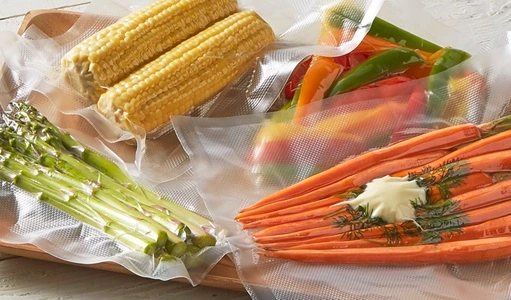When it comes to storing leftovers or preserving fresh food ingredients, vacuum sealers come in handy compared to the normal packaging. The preservation of food is imporatant in terms of taste and safety. By vacuum sealing, you can extend the storage period.
The vacuum sealing process sucks the air out of the packaging, thus creating an air-tight seal. Eliminating this oxygen from the pack reduces the risk of bacteria and mold developing, resulting of the ingredients can be stored in freezers, cupboards for longer duration.
Whether you’re storing leftovers, bulk ingredients in the freezer, or ingredients in the pantry, sealing your food in bags with the vacuum sealing process can make your food last up to five times longer than storing through traditional methods. However, the life expectancy of each sealed food can vary depending on its consistency, juiciness and extended capability. Let’s take a closer look at how does seal food lasts.

A comprehensive guide for Storage time with vacuum packaging
As stated above, life expectancy varies from food to food. Keep reading to know about some food ingredients that can last for a long if stored in vacuum-sealed packaging.
- Coffee Beans
Coffee beans can generally last for 4 weeks at room temperature, while vacuum-sealed beans last 16 months. Moreover, frozen beans can last between two to three years.
- Meat
Large cuts of meat such as lamb, beef poultry, and pork have a typical life expectancy of six months and can be stored in the freezer when vacuum sealed. Ground poultry, beef, pork and lamb only last about four months when frozen.
- Berries
Most berries, such as blackberries, raspberries, and strawberries lasts 1 to 3 days longer, if preserved in the refrigerator. Once they are vacuum-sealed, the 3-day lifespan turns into a full week. Better options, look to buy pre-frozen or freeze fruit yourself. While other berries, such as huckleberries, cranberries, and blueberries have a significantly extended refrigerator life of three to six days. The life span will be from two weeks if they are vacuum-sealed.
- Cheese
As we knows, cheese can be available in different forms like hard and semi-soft cheese, pasteurized cheese, cheese slices, etc. All type of cheese has a maximum refrigerator lifespan of 1 to 2 weeks. On the other hand, the life cycle of vacuum-sealed cheese can increase by 4 to 8 months in the refrigerator. However, keeping in mind that soft cheese types, such as ricotta, télme, camembert, and brie cannot be vacuum-packed for long periods.
- Oil
Non-preserved oils, such as canola, corn oil, sunflower may store at room temperature for maximum period of five to six months. Vacuum sealed packaging It lasts about 12 to 18 months. However, without any worries, you can now buy an adequate amount of oil that suits your cooking preferences at your convenience.
- Snacks
Some major and popular snacks like crackers, chips and cookies can harden after a week at room temperature. Even if vacuum-sealed, they don’t have a long lifespan, as they open from time to time, which means they are constantly deteriorating from the oxidation process. So, a vacuum seal extends the snack’s life by three to six weeks lastly. A better idea is to vacuum seal one portion at a time, which is perfect for afternoon tea or school lunches.
- Raw Ingredients
Uncooked ingredients like rice, sugar and flour last six months at room temperature. Dividing cooking ingredients into smaller quantities means they can last one to two years. While pantry ingredients like cereal, pasta, and other dry food items can be two to four duration as long as they do when stored conventionally, if they are vacuum sealed. Pantry ingredients like rice, sugar, flour and pasta can last about up to six months in the pantry without vacuum sealing. They can last up to two years when vacuum sealed.
- Cooked Food
When it comes to cooked foods being store in the refrigerator, a vacuum sealer also keeps food longer and fresher. It keeps your leftovers and meal prep foods fresh for longer. Food cooked in the fridge can last for about 1 to 3 days. Duration is up to two weeks when vacuum sealed, and can be stored in the fridge.
Benefits of Vacuum sealing process:
Having learned about the duration of specific types of food, let us now discuss why vacuum sealing is necessary, and how it is effective.
- Vacuum Seal prevents freezer burning
Freezer burn occurs when water in the freezer evaporates without liquefaction, drawing moisture out of foods and expelling them as vapour. Simply put, freezer burn is caused due to dehydration and oxidation. Evaporation of moisture produces a leathery, hard growth while oxidation causes the food to turn grey or brown. To prevent all this, using a vacuum seal is highly effective as it traps the natural moisture and prevents the food from evaporating. As a result, the life of the food will be extended.
- It prevents oxidation
Even though oxygen is essential to health and life, direct exposure to food in the air can ruin the taste and flavour. Ingredients that contain fat, such as dairy products, and vegetables produce compounds that produce an undesirable, pungent odour. Whether it is the oil spoiling or the browning of an avocado or a banana, the presence of oxygen creates an unpleasant taste and smell. Vacuum sealing eliminates all oxygen from your packaging and seals it off to prevent oxidation.
- Stops bacteria and Enzymes
Be it vegetables or fruits, all foods contain organic enzymes that cooperate with oxygen, causing food to go bad. And, this sealing stops the reaction of this enzyme in the affected food itself and also protects it from spoilage of other vegetables and fruits stored nearby.
Wrap Up!
Overall, frozen foods that are vacuum-sealed last two to three years. Most vacuum-sealed foods will keep for two to three weeks in the freezer. Using a vacuum seal helps storing the food for a long time by keeping it in good condition.
Hina Abbasi is Editor and a passionate sports and entertainment content writer at WinnersMaze.com. Hina’s expertise spans across a wide range of sports, and interest in many TV shows allowing her to deliver insightful analysis and compelling stories that resonate with readers.

